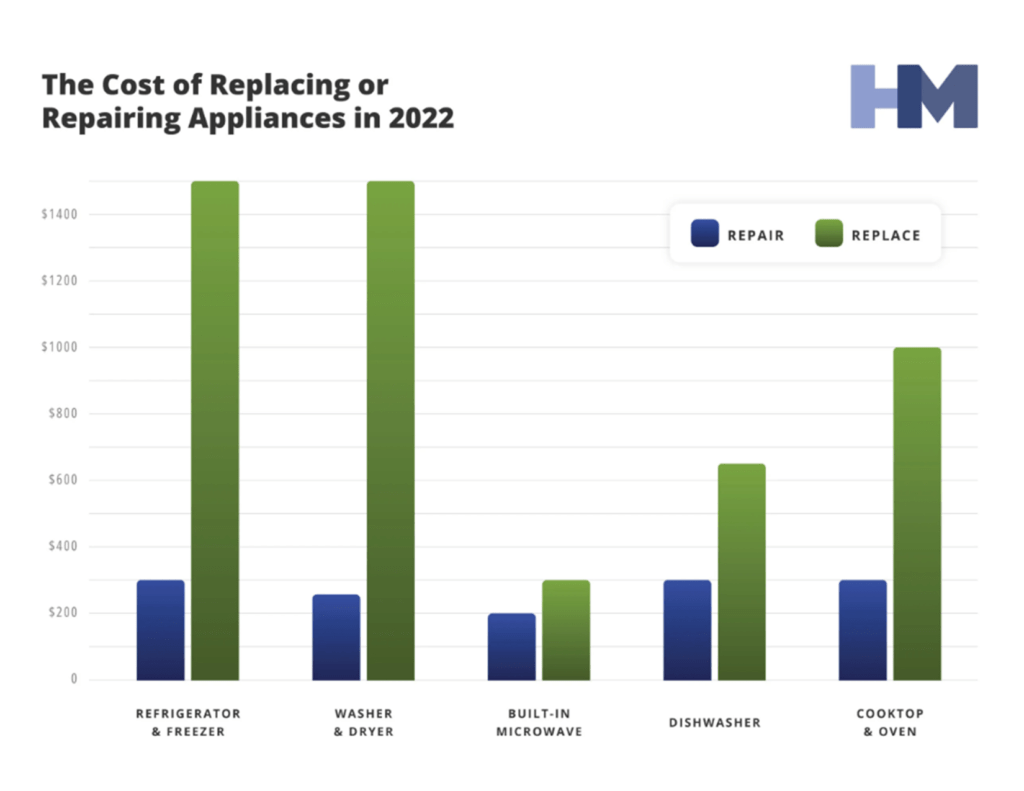It’s that sinking feeling—you walk into the kitchen and the floor is wet because there is a leak coming from the refrigerator or dishwasher. You turn on the oven and nothing happens. Drying clothes that don’t get dry? You get the idea—the appliances aren’t working. Now what? Should you replace it or repair it?
As your Remodel-Design-Build Team at The Cleary Company, we replace many appliances for our clients. But sometimes we have clients who want to keep one or more of their appliances. This isn’t usually a problem, especially if we know they are still in good shape. But if they may be replacing it 3-5 years after their remodel, we know it will take extra planning.
So what to do when an appliance fails? If it’s an easy fix, there’s usually no question about repairing it. But a bigger issue is one to stop and think about. What’s worth repairing and what’s worth replacing and how do you know?
Recently we read a report from House Method and found some great answers. House Method provides expert research on home service providers. Their reviews cover home warranty, pest control, and lawn service companies. They are a comprehensive source for home services research. Read the full report here.
Key Facts to Consider
- Over the last year, the inflation rate of appliance costs has risen an average of 7.8%.
- Typical households spent, on average, at least $354 per year on major appliances in 2022, compared to $214 in 2013.
- Most of us will need to have an appliance repaired every couple of years.
- Supply change issues continue to make it harder to get new appliances and, in some cases, replacement parts.
- Appliance prices continue to increase. (You know this if you’ve been looking)
- There’s more wear and tear on our appliances due to a year of more of work and school from home!
Repair or Replace
A study from the United States Public Interest Research Group notes that the average family could save $330 per year by repairing appliances, instead of replacing them. Weigh the pros and cons of the value, the life span, and the cost for repair of the appliance as opposed to replacing it. Also, consider the following—
- Repair costs include service fees and replacement costs but can save money since you aren’t buying a new appliance.
- Repairs generate less waste in a landfill.
- A home warranty (a service contract that can be purchased) extends the coverage of appliances past the manufacturer’s warranty.
- Most appliances last for 5-7 years, with repairs every 2-3 years (on average).
- Replacing might be the best option if you want new features, better efficiency, and lower repair costs.
Review the chart below to help you decide if you want to replace or repair.

Of course, sometimes a repair isn’t worth it if the problem is too big or expensive, parts aren’t available, or you can’t find someone to do the work!
Tips to Extend the Life Span of Your Appliances
Regular care & maintenance can save you money and expensive repairs down the line.
- Clean the clothes dryer lint trap after every use.
- Empty or rinse the dishwasher filter every few months.
- Microwaves and ovens work best when cleaned.
- Keep vents clear from debris and clean filters as needed.
- Empty the refrigerator and freezer occasionally to get rid of unwanted food and clean the shelves.
- Vinegar and baking soda are your friends. Do a website search for the best ways to use them on your appliances. We like the cleaning tips on this website.
Repair or replace? Ultimately it will come down to several factors—age, cost, what the repair entails, energy efficiency and what your needs are.
Need of a remodel? Give us a call at 614-459-4000. We’d love to design and build your vision for your home.
